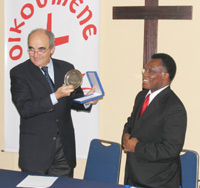
Ministro secretario general de la presidencia Eduardo Dockendorff con secretario general del Consejo Mundial de Iglesias pastor Samuel Kobia.
Minister secretary general of the presidency Eduardo Dockendorff with World Council of Churches general secretary Rev. Dr Samuel Kobia.
(c) WCC/Juan Michel
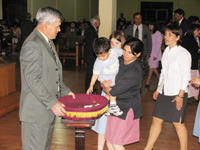
Miembros de la Iglesia Pentecostal de Chile en Curicó ofrendan durante el culto celebrado en ocasión de la visita del secretario general del Consejo Mundial de Iglesias.
Members of the Pentecostal Church of Chile in Curicó making the offering during a worship service celebrating the visit from the World Council of Churches general secretary.
(c) WCC/Juan Michel
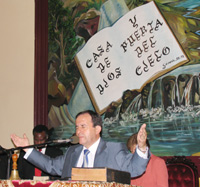
Obispo Ulises Muñoz, de la Iglesia Pentecostal de Chile, ora durante el culto celebrado en el templo catedral de esa iglesia en Curicó en ocasión de la visita del secretario general del Consejo Mundial de Iglesias.
Bishop Ulises Muñoz of the Pentecostal Church of Chile prays during a worship service held in the church's cathedral in Curicó during visit from the World Council of Churches general secretary.
(c) WCC/Juan Michel
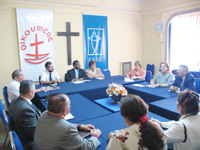
Obispos y pastores pentecostales chilenos se encuentran con el secretario general del Consejo Mundial de Iglesias en la sede de la Fundación de Ayuda Social de las Iglesias Cristianas (FASIC) en Santiago.
Chilean Pentecostal bishops and pastors meet with the World Council of Churches general secretary in the headquarters of the Social Aid Foundation of Christian Churches (FASIC) in Santiago.
(c) WCC/Juan Michel
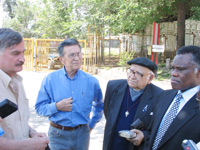
De izq. a der.: Rodrigo del Villar y Hernán Plaza, ambos sobrevivientes del campo de detención clandestino Villa Grimaldi, ubicado en las afueras de Santiago, explican su funcionamiento al obispo emérito Federico Pagura y al pastor Samuel Kobia, presidente por América Latina y secretario general, respectivamente, del Consejo Mundial de Iglesias.
(From left to right) Rodrigo del Villar and Hernán Plaza, both survivors of the clandestine Villa Grimaldi detention camp located outside Santiago, explain how the camp operated to Bishop Emeritus Federico Pagura and Rev. Dr Samuel Kobia, World Council of Churches president from Latin America and general secretary respectively.
(c) WCC/Juan Michel
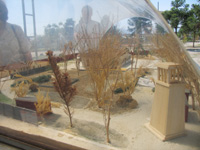
Maqueta del campo de detención clandestino Villa Grimaldi, ubicado en las afueras de Santiago. La torre de vigilancia era también lugar de encierro, con celdas de un metro cuadrado en las que se apretujaban cuatro detenidos. Al fondo a la izquierda otro conjunto de celdas e instalaciones donde se practicaba la tortura.
A model of the clandestine Villa Grimaldi detention camp, located outside Santiago. The watchtower was also a holding area, with one-metre square cells that held four prisoners at a time. At back left, another group of cells and areas where torture was practised.
(c) WCC/Juan Michel
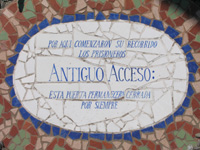
Placa que señala la ubicación de la antigua puerta de acceso al campo de detención clandestino Villa Grimaldi. "Por aquí comenzaron su recorrido los prisioneros", dice la inscripción, "Esta puerta permanecerá cerrada por siempre".
Plaque showing the location of the access door to the clandestine Villa Grimaldi detention camp. "Here is where prisoners began their stay," says the inscription. "This door will remain closed forever."
(c) WCC/Juan Michel
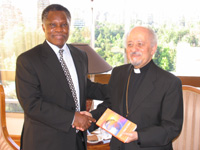
Arzobispo metropolitano de Santiago monseñor Sergio Abad, de la Iglesia Ortodoxa del Patriarcado de Antioquía, con el secretario general del Consejo Mundial de Iglesias pastor Samuel Kobia.
Metropolitan Archbishop of Santiago Msgr. Sergio Abad, of the Orthodox Patriarchate of Antioch with World Council of Churches general secretary Rev. Dr Samuel Kobia.
(c) WCC/Juan Michel
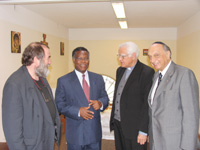
Los tres copresidentes de la Confraternidad Judeo Cristiana del Uruguay dialogan con el secretario general del Consejo Mundial de Iglesias durante su visita a Montevideo. De izq. a der.: pastor Armin Ihle (protestante); pastor Samuel Kobia (CMI); obispo Luis del Castillo (católico); escribano Rafael Stawsky (judío).
The three co-presidents of the Jewish-Christian Brotherhood of Uruguay met with the WCC general secretary during his visit to Montevideo. (From left) Rev. Armin Ihle (Protestant), Rev. Dr Samuel Kobia (WCC), Bishop Luis del Castillo (Catholic), Notary Rafael Stawsky (Jewish).
(c) WCC/Juan Michel
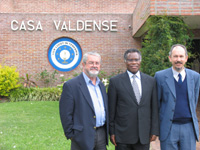
Visita del secretario general del Consejo Mundial de Iglesias a Colonia Valdense. De izq. a der.: pastor Oscar Bolioli, presidente de la Iglesia Metodista en el Uruguay; pastor Samuel Kobia, secretario general del CMI; pastor Hugo Armand Pilón, moderador de la Iglesia Evangélica Valdense del Río de la Plata.
WCC general secretary's visit to Colonia Valdense. (From left) Rev Oscar Bolioli, president of the Evangelical Methodist Church in Uruguay, Rev. Dr Samuel Kobia, WCC general secretary, and Rev. Hugo Armand Pilón, moderator of the Evangelical Waldensian Church of the River Plate.
(c) WCC/Juan Michel
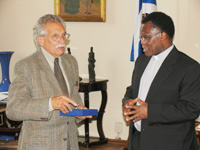
El intendente de la ciudad de Montevideo, arquitecto Mariano Arana, con el pastor Samuel Kobia, secretario general del Consejo Mundial de Iglesias.
Montevideo mayor, architect Mariano Arana, with Rev. Dr Samuel Kobia, WCC general secretary.
(c) WCC/Juan Michel
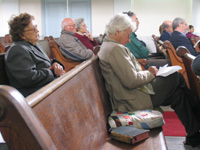
Miembros de la congregación local en Colonia Valdense durante la celebración realizada con motivo de la visita del secretario general del Consejo Mundial de Iglesias.
Member of the Colonia Valdense congregation during a special service for the WCC general secretary's visit.
(c) WCC/Juan Michel
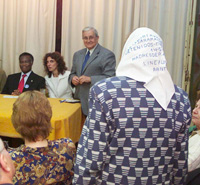
Reunión del secretario general del CMI con representantes de organizaciones de derechos humanos. Preside la reunión el obispo emérito Aldo Etchegoyen (de pie), miembro del comité central del CMI, quien acompañó a Kobia durante su visita al Brasil y a la Argentina.
Meeting of the WCC general secretary with representatives from human rights organizations. Presiding the meeting is Bishop Emeritus Aldo Etchegoyen (standing). Etchegoyen is a member of the WCC central committee, and accompanied Kobia during his visit to Brazil and Argentina.
(c) WCC/Adrián Stehlik
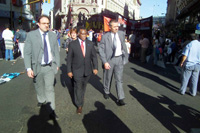
El secretario general del CMI camina en medio de una manifestación de 'piqueteros'. Excluidos del mercado del trabajo, han hecho del 'piquete' que corta rutas, puentes y calles una metodología para hacer oír sus reclamos.
WCC general secretary walks in the midst of a "picketers" demonstration. Excluded from the labour market, these demonstrators cut off streets, bridges and different routes in order to make their demands heard.
(c) WCC/Adrián Stehlik
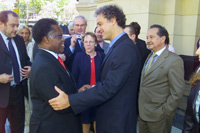
El jefe de gobierno de la ciudad de Buenos Aires, Dr. Aníbal Ibarra, saluda al secretario general del CMI a su llegada a la sede del gobierno de la ciudad. Kobia fue nombrado visitante ilustre de la ciudad.
Head of the city of Buenos Aires government, Dr Aníbal Ibarra, greets the WCC general secretary upon his arrival at the seat of government. Kobia was named a illustrious visitor to the city.
(c) WCC/Adrián Stehlik
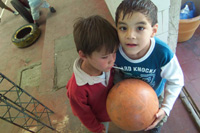
Niños del Centro Comunitario La Tablada de la Iglesia de los Discípulos de Cristo. Unos 90 niños reciben allí cotidianamente alimentación y apoyo escolar, y unos 15 jóvenes son capacitados en oficios.
Children at the La Tablada Disciples of Christ community centre. Some 90 children receive daily meals and help with school work, and some 15 young people receive job training.
(c) WCC/Adrián Stehlik
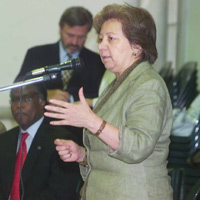
Marta Palma, encargada de la oficina para América Latina del CMI, explica a líderes de iglesias argentinas el concepto y las maneras de participar en el 'Mutirao' que se llevará a cabo junto a la Asamblea del CMI en febrero de 2006.
Marta Palma, responsible for the WCC Latin America office, explains the concept and how to participate in the "Mutirao" to Argentinean church leaders. The event will take place in parallel to the WCC assembly in February 2006.
(c) WCC/Adrián Stehlik
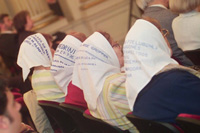
Un grupo de Madres de Plaza de Mayo asiste a la conferencia sobre 'Globalización y vioencia' pronunciada por el secretario general del CMI.
A group of Mothers of the Plaza de Mayo at a presentation on "Globalization and violence," by the WCC general secretary.
(c) WCC/Adrián Stehlik
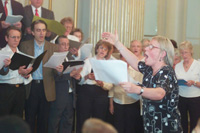
Uno de los coros que participaron del acto público en el Salón Dorado de la Legislatura de la ciudad de Buenos Aires en el cual el secretario general del CMI disertó sobre 'Globalización y vioencia'.
One of the choirs which sang during a public ceremony in the city of Buenos Aires legislature at which the WCC general secretary addressed the topic of "Globalization and violence."
(c) WCC/Adrián Stehlik
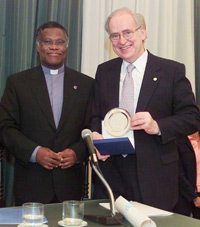
Rector de la Universidad de Buenos Aires (UBA) Dr. Guillermo Jaim Etcheverri (der.) y flamante profesor honorario de esa casa de estudios Rev. Dr. Samuel Kobia (izq.).
Dean of the University of Buenos Aires (UBA) Dr Guillermo Jaim Etcheverri (right) and honorary professor of the university, the Rev. Dr Samuel Kobia (left).
(c) WCC/Adrián Stehlik
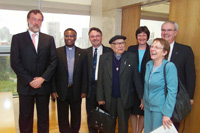
El ministro de Relaciones Exteriores, Comercio Exterior y Culto Dr. Rafael Bielsa (primero de la izq.) recibe a la delegación ecuménica integrada por (de izq. a der.): pastor Samuel Kobia, secretario general del CMI; pastor Juan Abelardo Schvindt, vicepresidente segundo del Consejo Latinoamericano de Iglesias; obispo emérito Federico Pagura, copresidente del CMI; pastora Annedore Venhaus, vicepresidente de la Iglesia Evangélica del Río de la Plata; obispo Nelly Ritchie, de la Iglesia Evangélica Metodista Argentina; licenciado Elías Abramides, vicepresidente de la Comisión Ecuménica de las Iglesias Cristianas en la Argentina.
Minister of Foreign Affairs, Foreign Trade and Worship, Dr Rafael Bielsa (first on left) welcomes the ecumenical delegation that includes (from left to right) Rev. Dr Samuel Kobia, general secretary of the WCC, Rev. Juan Abelardo Schvindt, 2nd vice president of the Latin American Council of Churches; Bishop emeritus Federico Pagura, WCC co-president; Rev. Annedore Venhaus, vice president of the Evangelical Church of the River Plate, Bishop Nelly Ritchie of the Argentine Methodist Church, Elías Abramides, vice president of the Ecumenical Commission of Christian Churches in Argentina.
(c) WCC/Adrián Stehlik
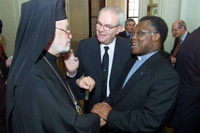
Samuel Kobia saluda a Arzobispo Kirilos Doumat, titular de la Metrópolis Argentina del Patriarcado de Antioquía durante la recepción ofrecida en el Palacio San Martín por el secretario de Culto, embajador Guillermo Oliveri. En el centro, licenciado Elías Abramides, vicepresidente de la Comisión Ecuménica de las Iglesias Cristianas en la Argentina.
Samuel Kobia greets Archbishop Kirilos Douomat, Metropolitan of the Patriarchat of Antioch, during the reception offered in the San Martin Palace by the Worship Secretary, Ambassador Guillermo Oliveri. Between them, Lic. Elías Abramides, vice president of the Ecumenical Commission of Christian Churches in Argentina.
(c) WCC/Adrián Stehlik
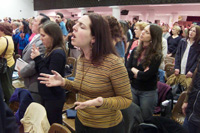
Un momento de la celebración ecuménica con la que dio comienzo la visita del secretario general del CMI a Buenos Aires. La celebración tuvo lugar en una congregación de la Iglesia Cristiana Bíblica que preside el pastor Héctor Petrecca.
A moment during ane ecumenical celebration at the beginning of the WCC general secretary's visit to Buenos Aires. The celebration took place in a Christian Biblical Church congregation, and was presided by Pastor Hector Petrecca.
(c) WCC/Adrián Stehlik
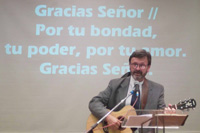
El secretario de la región rioplatense del Consejo Latinoamericano de Iglesias (CLAI) animó litúrgicamente la celebración ecuménica con la que dio comienzo la visita del secretario general del CMI a Buenos Aires. La celebración tuvo lugar en una congregación de la Iglesia Cristiana Bíblica que preside el pastor Héctor Petrecca.
The secretary of the Latin American Council of Churches' (CLAI) River Plate region at an ecumenical celebration marking the beginning of the WCC general secretary's visit to Buenos Aires. The celebration took place in a Christian Biblical Church congregation, and was presided by Pastor Hector Petrecca.
(c) WCC/Adrián Stehlik
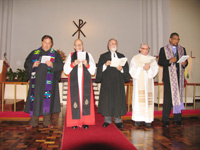
Líderes de iglesias brasileñas durante la celebración ecuménica llevada a cabo en Porto Alegre el 9 de noviembre de 2004. Durante la misma las iglesias locales manifestaron su compromiso con la Asamblea del CMI a realizarse en febrero de 2006.
Leaders from Brazilian churches during an ecumenical celebration in Porto Alegre on 9 November, 2004. During the celebration, local churches expressed their commitment to the WCC Assembly to be held in February 2006.
(c) WCC/Juan Michel
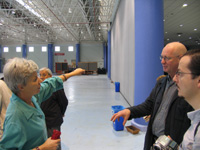
Miembros del Comité de Planificación de la Asamblea y personal del CMI visitan la sede de la Pontificia Universidad Católica de Porto Alegre e inspeccionan las instalaciones donde tendrá lugar la Asamblea del Consejo en febrero de 2006.
Members of the Assembly Planning Committee and WCC staff visited the Pontifical Catholic University of Porto Alegre and inspected the site where the Council’s Assembly will take place in February 2006.
(c) WCC/Juan Michel
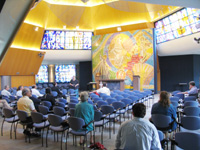
La capilla de la Pontificia Universidad Católica de Porto Alegre donde tendrá lugar la Asamblea del Consejo en febrero de 2006.
The chapel of the Pontifical Catholic University of Porto Alegre where the WCC Assembly will take place in February 2006.
(c) WCC/Juan Michel
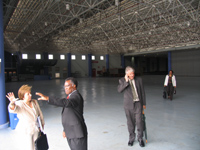
Secretario general del CMI Samuel Kobia visita las instalaciones de la Pontificia Universidad Católica de Porto Alegre donde tendrá lugar la Asamblea del Consejo en febrero de 2006. Lo acompaña Marta Palma, secretaria del CMI para América Latina. Más atrás el coordinador local de la Asamblea, pastor Rui Bernhard.
WCC general secretary Samuel Kobia visits the Pontifical Catholic University of Porto Alegre where the Council’s Assembly will take place in February 2006. He was accompanied by Marta Palma, WCC secretary for Latin America. In the background is thelocal Assembly coordinator, Pastor Rui Bernhard.
(c) WCC/Juan Michel
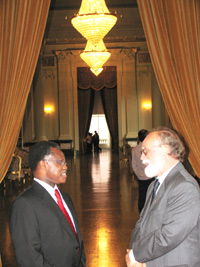
El presidente de la Iglesia Evangélica de Confesión Luterana en el Brasil, pastor Walter Altmann (der.), acompañó al secretario general del CMI Samuel Kobia (izq.) durante las visitas a las autoridades estatales y municipales en Porto Alegre.
The president of the Evangelical Church of the Lutheran Confession of Brazil, Pastor Walter Altmann (right), accompanied WCC general secretary Samuel Kobia (left) during visits to state and municipal authorities in Porto Alegre.
(c) WCC/Juan Michel
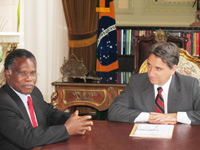
Secretario general del CMI Samuel Kobia (izq.) dialoga con el gobernador del estado de Rio Grande do Sul, Germano Rigotto (der.).
WCC general secretary Samuel Kobia (left) speaks with the governor of the state of Rio Grande do Sul, Germano Rigotto (right).
(c) WCC/Juan Michel
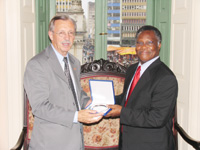
Secretario general del CMI Samuel Kobia (izq.) dialoga con el intendente de la ciudad de Porto Alegre, Joao Verle (der.).
WCC general secretary Samuel Kobia (left) speaks with the mayor of the city of Porto Alegre, Joao Verle (right).
(c) WCC/Juan Michel
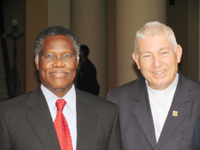
El arzobispo católico de Porto Alegre, Dom Dadeus Grings (der.), acompañó al secretario general del CMI Samuel Kobia (izq.) durante las visitas a las autoridades estatales y municipales en Porto Alegre.
The Catholic Archbishop of Porto Alegre, Dom Dadeus Grings (right) accompanied WCC general secretary Samuel Kobia (left) during visits to state and municipal authorities in Porto Alegre.
(c) WCC/Juan Michel
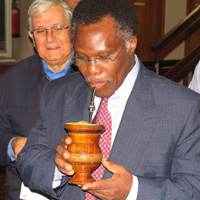
Secretario general del CMI Samuel Kobia prueba un 'cimarrao', infusión muy popular en el estado de Rio Grande do Sul, bajo la atenta mirada del obispo Aldo Etchegoyen, miembro del comité central del CMI, quien lo acompaña durante la gira sudamericana.
WCC general secretary Samuel Kobia tries a ‘cimarrao,’ a very popular infusion in the state of Rio Grande do Sul, under the watchful eye of Bishop Aldo Etchegoyen, member of the WCC Central committee, who is accompanying Kobia on a trip to South America.
(c) WCC/Juan Michel
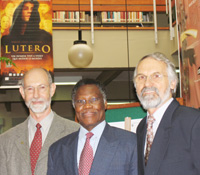
El secretario general del CMI Samuel Kobia (izq.) visitó la sede de la Escuela Superior de Teología de la Iglesia Evangélica de Confesión Luterana en el Brasil en Sao Leopoldo, cerca de Porto Alegre. El rector Prof. Dr. Lothar Hoch (centro) y el vicerector Prof. Martin Volkmann (der.) interiorizaron a Kobia del trabajo de la escuela.
WCC general secretary Samuel Kobia (left) visits the headquarters of the Evangelical Church of the Lutheran confession of Brazil's theological school, close to Porto Alegre. Dean Prof. Dr Lothar Hoch (center) and Vice Dean Prof. Martin Volkmann (right) explain the school's work.
(c) WCC/Juan Michel
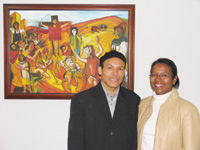
Pedro Acosta Leyva, miembro de la Iglesia de Dios (pentecostal) en Cuba, y Selenir Goncalvez Kronbauer, miembro de la Iglesia Católica Romana, son estudiantes de posgrado en Escuela Superior de Teología de la Iglesia Evangélica de Confesión Luterana en el Brasil en Sao Leopoldo. Ambos participan del Grupo Identidad, cuyo propósito es crear espacios para afrodescendientes dentro de la iglesia luterana.
Pedro Acosta Leyva, a member of the Church of God (Pentecostal) in Cuba and Selenir Goncalvez Kronbauer, a member of the Roman Catholic Church, are students at the Evangelical Church of the Lutheran confession of Brazil's theological school in Sao Leopoldo. Both participate in an "Identity Group" designed to create space for Afro-descendants within the Lutheran Church.
(c) WCC/Juan Michel
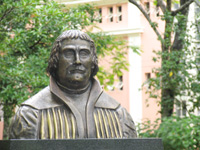
Busto del reformador Martín Lutero inaugurado el 17 de octubre de 2004 con motivo del 180 aniversario del comienzo de la inmigración alemana al Brasil y de la consiguiente presencia luterana. A sus espaldas, la sede de la Escuela Superior de Teología de la Iglesia Evangélica de Confesión Luterana en el Brasil en Sao Leopoldo.
Bust of reformer Martin Luther, inauguraed on 17 October, 2004 to celebrate the 180th anniversary of German migration to Brazil and the Lutheran presence there. Behind the bust, the headquarters of the Evangelical Church of the Lutheran confession of Brazil's theological school in Sao Leopoldo.
(c) WCC/Juan Michel
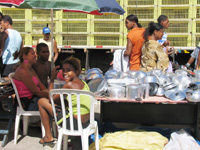
Día de mercado. Todo tipo de artículos usados se compran y venden en la calle.
Market day. All kinds of second-hand articles are bought and sold on the street.
(c) WCC/Juan Michel
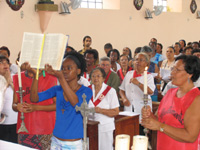
Celebración ecuménica en la parroquia católica Nuestra Señora de la Concepción en Periperi, Salvador. La Biblia es llevada al altar en una pequeña procesión danzante acompañada con música.
Ecumenical celebration in Catholic parish Nuestra Señora de la Concepción in Periperi, Salvador. The Bible is carried to the altar by a small dancing procession accompanied by music.
(c) WCC/Juan Michel
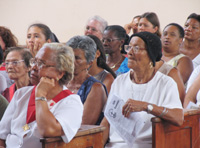
Participantes en la celebración ecuménica en la parroquia católica Nuestra Señora de la Concepción en Periperi, Salvador.
Participants in an ecumenical celebration in a Catholic parish Nuestra Señora de la Concepción in Periperi, Salvador.
(c) WCC/Juan Michel
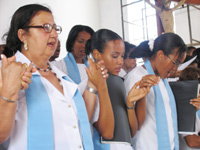
Miembros del coro de la parroquia católica Nuestra Señora de la Concepción en Periperi, Salvador, oran durante la ceremonia ecuménica.
Members of the choir in the Catholic parish Nuestra Señora de la Concepción in Periperi, Salvador, pray during ecumenical ceremony.
(c) WCC/Juan Michel
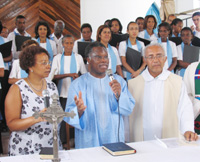
Secretario general del CMI Samuel Kobia saluda a la congregación durante la celebración ecuménica en la parroquia católica Nuestra Señora de la Concepción en Periperi, Salvador. A su lado el párroco de la iglesia Antonio Olivera y Marilía Schüller, responsable del Programa de Lucha contra el Racismo.
WCC general secretary Samuel Kobia greets the congregation during an ecumenical celebration in the Catholic Parish Nuestra Señora de la Concepción in Periperi, Salvador. Beside him, Rev. Antonio Olivera, parish priest, and Marilía Schüller, responsible for the Programme to Combat Racism.
(c) WCC/Juan Michel
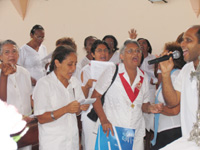
Otro grupo musical que animó la ceremonia ecuménica en la parroquia católica Nuestra Señora de la Concepción en Periperi, Salvador. Muchos de los participantes lucían el collar rojo de la Hermandad del Sagrado Corazón.
Another musical group that accompanied the ecumenical ceremony in the Catholic parish Nuestra Señora de la Concepción in Periperi, Salvador. Many of the participants are wearing the red sash of the Brotherhood of the Sacred Heart.
(c) WCC/Juan Michel
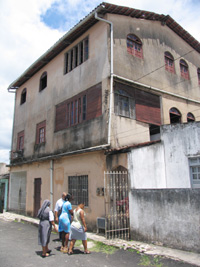
Representantes de comunidades eclesiales y organizaciones populares ingresan al centro parroquial Dom Helder Cámara, en Periperi, Salvador, donde se habló sobre la próxima Asamblea del CMI, a celebrarse en febrero de 2006 en Porto Alegre.
Representatives from church communities and grassroots organizations enter the Dom Helder Cámara parish centre in Periperi, Salvador where they discussed the next WCC assembly, to be held in February 2006 in Porto Alegre.
(c) WCC/Juan Michel
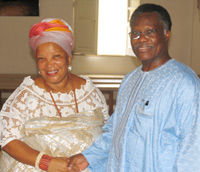
Secretario general del CMI Samuel Kobia saluda a Atamira Cecília dos Santos (Mãe Tatá), la Mae de Santo del 'terreiro' Casa Branca, fundado hace unos 200 años y considerado el más antiguo de Salvador.
WCC general secretary Samuel Kobia greets Atamira Cecília dos Santos (Mae Tatá), the Mae de Santo of the Casa Branca “terreiro”, founded some 200 years ago and considered the oldest in Salvador.
(c) WCC/Juan Michel
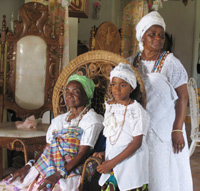
Tres generaciones de Candomblé posan para fotografías destinadas a un folleto turístico en el 'terreiro' Casa Branca, fundado hace unos 200 años y considerado el más antiguo de Salvador.
Three generations of Candomblé pose for photographs for a tourist flyer in the Casa Branca “terreiro”, founded some 200 years ago and considered the oldest in Salvador.
(c) WCC/Juan Michel
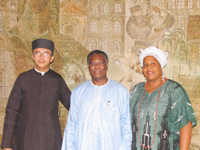
Cristianismo y Candomblé. Jaciara Ribeiro (der.), Mae de Santo del terreiro Axé Abassá de Ogum relató su lucha en los tribunales para obtener resarcimiento por una publicación agraviante en un periódico de filiación religiosa. Padre Jorge Costa, de la Iglesia Ortodoxa Siria (izq.), manifestó simpatía por todas las expresiones religiosas y rechazó toda forma de discriminación. Ambos se encontraron con motivo de la reunión de representantes del cristianismo y de religiones afrobrasileñas con Samuel Kobia (centro), secretario general del CMI.
Christianity and Candomblé. Jaciara Ribeiro (right), Mae de Santo of the terreiro Axé Abassá de Ogum, tells of her struggle in the courts to obtain compensation for derogatory comments in a newspaper affiliated to a religious organization. Rev. Jorge Costa, of the Orthodox Syrian Church (left) expressed support for all religious expressions and rejected all discrimination. The two were participating in a meeting of representatives from Christian churches and Afro-Brazilian religions with Samuel Kobia (center), WCC general secretary.
(c) WCC/Juan Michel
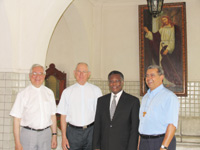
El secretario general del CMI Samuel Kobia visita la reunión de la Regional Nordeste III de la Conferencia Nacional de Obispos del Brasil (CNBB), donde dialogó con su secretario general y responsable por el ecumenismo en Bahía obispo Dom Paulo Romeu Dantas Bastos (der.), con el vicepresidente segundo de la Conferencia Episcopal Latinoamericana (CELAM) arzobispo Dom Geraldo Lidio Rocha (izq), y con el arzobispo Dom Itamar Vian (centro).
WCC general secretary Samuel Kobia visits the Northeast III Regional meeting of the National Brazilian Bishops’ Conference (CNBB), where he spoke with the general secretary and the person responsible for ecumenism in Bahia, Bishop Dom Paulo Romeu Dantas Bastos (right), with the second vice president of the Latin American Bishops’ Conference (CELAM) Archbishop Dom Geraldo Lidio Rocha (left), and with Archbishop Dom Itamar Vian (centre).
C/Juan Michel
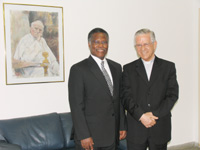
El secretario general del CMI Samuel Kobia se encuentra con el presidente de la Conferencia Nacional de Obispos del Brasil (CNBB) y arzobispo primado del Brasil Dom Geraldo Magela.
WCC general secretary Samuel Kobia met with the president of the National Brazilian Bishops’ Conference (CNBB) and the archbishop primate of Brazil, Dom Geraldo Magela.
(c) WCC/Juan Michel
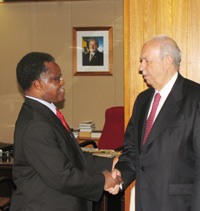
Secretario general del CMI Samuel Kobia (izq.) y vicepresidente del Brasil José Alencar (der).
WCC general secretary Samuel Kobia (left) with the vice president of Brazil José Alencar (right).
(c) WCC/Juan Michel
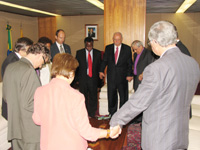
Participantes del encuentro de líderes ecuménicos con el vicepresidente brasileño oran al finalizar la reunión.
Participants in the meeting of ecumenical leaders with the Brazilian vice president praying at the end of the meeting.
(c) WCC/Juan Michel
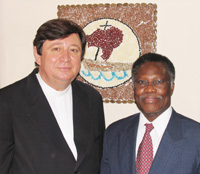
Arzobispo católico de Brasilia Dom Joao Braz de Aviz (izq.), y secretario general del CMI Samuel Kobia (der.).
The Roman Catholic archbishop of Brazilia, Dom Joao Braz de Aviz (left) with WCC general secretary Samuel Kobia (right).
(c) WCC/Juan Michel
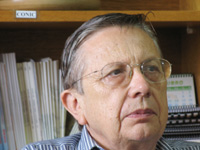
El pastor Ervino Schmidt, secretario general del Consejo Nacional de Iglesias Cristianas (CONIC) del Brasil, pide más tiempo para la Campaña de Entrega Voluntaria de Armas que se propone desarmar a la población brasileña.
Rev. Ervino Schmidt, general secretary of the National Council ofChristian Churches in Brazil (CONIC), pleads for more time for a campaign to get people to hand in their guns that aims at disarming Brazilian society.
(c) WCC/Juan Michel
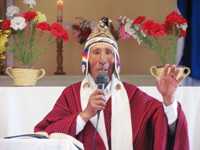
Fundador. El pastor Fermín Siñani pastorea la congregación de la IELB en Calasaya desde que la fundó en 1969, hace 35 años.
Founder. Pastor Fermín Siñani has led the IELB congregation in Calasaya since he founded it in 1969, 35 years ago.
(c) WCC/Juan Michel
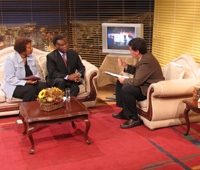
Televisión. Kobia es entrevistado por el periodista John Arandia en el programa "Que no me pierda", de la Red Uno de televisión, de alcance nacional. Marilia Schüller, responsable del Programa de Combate al Racismo del CMI oficia de intérprete.
Television. Kobia is interviewed by journalist John Arandia in the program “Que no me pierda” on national Network One. Marilia Schüller, responsible for the WCC Program to Combat Racism acts as interpreter.
(c) WCC/Juan Michel
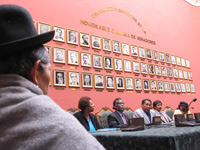
Encuentro con parlamentarios. Kobia participa junto a líderes de iglesias locales en un encuentro con senadores y diputados, en su mayoría indígenas, en el Salón de los Retratos de la Cámara de Senadores del Palacio Legislativo de Bolivia. De izq. a der.: Marilia Schüller, Samuel Kobia, Carlos Intipampa, pastor Emilio Aslla (IELB), senador Marcelo Aramayo Pérez. De espaldas a la izquierda: diputada indígena Isabel Ortega.
Meeting legislators: Kobia and local church leaders meet with senators and congressmen, the majority indigenous, in the Senate Chamber in the Bolivian legislative palace. From left to right: Marilia Schüller, Samuel Kobia, Carlos Intipampa, pastor Emilio Aslla (IELB), senator Marcelo Aramayo Pérez. From the back, to the left: indigenous representative Isabel Ortega.
(c) WCC/Juan Michel
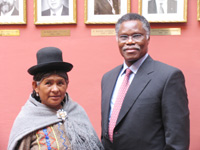
Diputada indígena Isabel Ortega y secretario general del CMI Samuel Kobia en el Salón de los Retratos de la Cámara de Senadores del Palacio Legislativo de Bolivia.
Indigenous representative Isabel Ortega and WCC general secretary Samuel Kobia in the Portraits Room of the Senate Chamber in the Bolivian legislative palace.
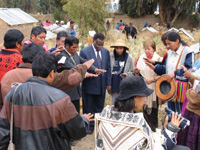
Inculturación. El secretario general del CMI participa en una ceremonia cristiana de rememoración de los difuntos en el cementerio de la localidad de Kheasqapa, a unos 150 kilómetros de La Paz.
Inculturation. WCC general secretary participates in a Christian ceremony to remember the dead in the cemetery in Kheasqapa, some 150 kilometers from La Paz.
(c) WCC/Juan Michel
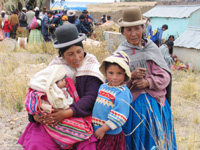
De todas la edades. Familiares de difuntos acuden al cementerio el 2 de noviembre al mediodía, cuando concluye la festividad de Todos los Santos iniciada el día anterior.
All ages. Families of the deceased head to cemetery on November 2 at mid-day at the end of the All Saint’s Day festivities that began a day earlier.
(c) WCC/Juan Michel
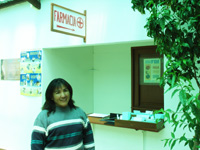
Obra pionera. En Ancoraimes, localidad situada a unos 70 kilómetros de la capital, Kobia visitó el Hospital Franz S. Beck. Creado por la Iglesia Metodista en los años 50 fue el primero de la zona y brindó atención a varias localidades vecinas. "Hoy las enfermedades más comunes que atendemos son neumonías, diarreas, desnutrición infantil", explica la doctora Marleny Jaimes, médica generalista. Además se realiza vacunación y seguimiento a los recién nacidos, y orientación en planificación familiar, todo con un enfoque pluricultural.
Pioneer work: In Ancoraimes, located 70 kilometers from the capital, Kobia visited the Franz S. Beck Hospital. Created by the Methodist Church in the 1950s it was the first in the area and provide care to several surrounding districts. “Today the most common illnesses we treat are pneumonia, diarrhea and infant malnutrition,” said Dr. Marleny Jaimes, a general practitioner. The hospital staff also vaccinates and monitors newborns and provides family planning orientation, all within a multicultural focus.
(c) WCC/Juan Michel
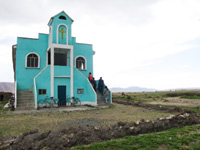
Templo de la congregación de la IELB en Calasaya, a unos 60 kilómetros de La Paz. "Este es el mejor templo que tenemos en este distrito", explica el tesorero de la iglesia, pastor Rufino Tito Aguilar, "en otras comunidades los hermanos no tienen bancos donde sentarse".
IELB church in Calasaya, some 60 kilometers from La Paz. “This is the best church we have in this district,” said Church treasurer Pastor Rufino Tito Aguilar. “In other communities the brothers and sisters do not have benches to sit on.”
(c) WCC/Juan Michel
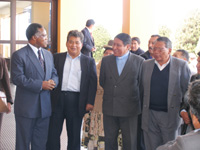
A 5.000 metros sobre el nivel del mar. Lideres de las iglesias miembros del Consejo en Bolivia dan la bienvenida al secretario general del CMI en el aeropuerto internacional "El Alto", de la ciudad de La Paz. De izq. : Samuel Kobia, Eugenio Poma (responsable del programa de pueblos indígenas del CMI y del Consejo Latinoamericano de Iglesias), Carlos Intipampa (obispo presidente de la Igelsia Evangélica Metodista en Bolivia), y Juan Miguel Parrapo (vicepresidente de la Iglesia Evangélica Luterana en Bolivia).
5,000 meters above sea level. Leaders from Council member Churches in Bolivia welcome WCC General Secretary in the international “El Alto” Airport in the city of La Paz. From left to right: Samuel Kobia, Eugenio Poma (responsible for the WCC and Latin American Council of Churches indigenous peoples program) Carlos Intipampa (bishop president of the Evangelical Methodist Church of Bolivia), and Juan Miguel Parrapo (vice president of the Evangelical Lutheran Church in Bolivia).
(c) WCC/Juan Michel
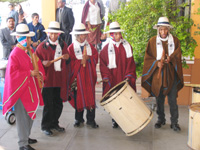
Bienvenida en "El Alto". Un grupo musical autóctono saluda al secretario general del CMI.
Welcome in “El Alto”. An indigenous music group greets the WCC general secretary.
(c) WCC/Juan Michel
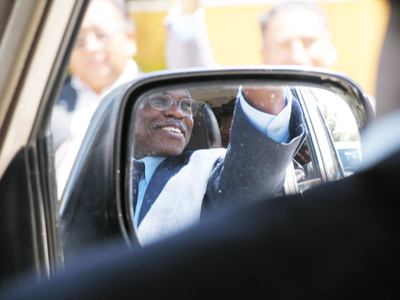
Bienvenida en "El Alto". Kobia saluda a quienes acudieron a recibirlo.
Welcome in "El Alto". Kobia greets those who have ocme to meet him.
(c) WCC/Juan Michel
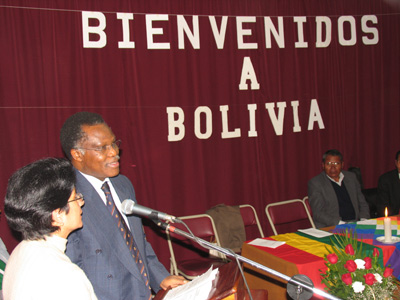
Bienvenidos. Asistido por una intérprete Kobia habla ante los participantes en una recepción en su honor.
Welcome. With the help of an interpreter, Kobia speaks to participants at a reception in his honour.
(c) WCC/Juan Michel